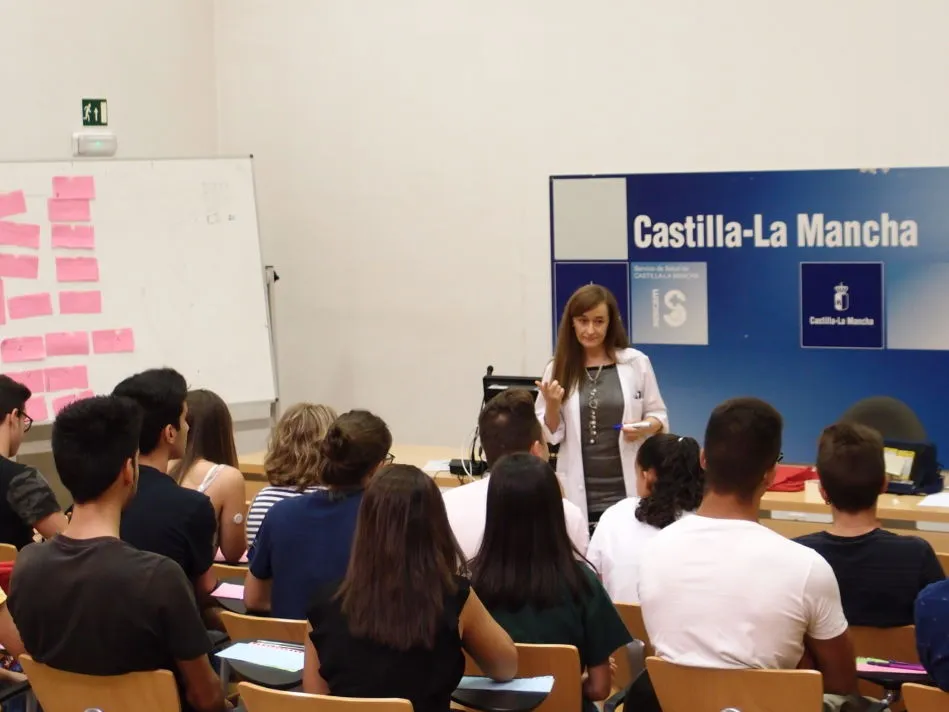
The Diabetes Education Nurse Consultation forms children and adolescents
The objective is to develop recreational activities that help the minors to handle diabetes with a normalization and disdormalization approach.
Type 1 diabetes is suddenly presented and is diagnosed in children after a serious process or a sharp symptomatic picture.
Both minors and families find the surprise of a disease whose existence or suspected and that will not only affect the child who has debuted with diabetes, but the treatment will imply the whole family.
The diabetic debut is lived, in many cases, as "a real chaos for families and parents are perceived so defenseless and vulnerable, given the new situation, as to the children themselves," explains nurse Mª José Sánchez, responsible forThe Education Consultation in Diabetes Infantil (CEDI) of the General University Hospital of Ciudad Real, under the Health Service of Castilla-La Mancha.A resource that has been a year since its consolidation and that, after more than a decade of previous work, has become a reference for children with diabetes in the province of Ciudad Real.
In Diabetes "Education is the basic pillar for the control and management of pathology", so in this specialized consultation learning is a continuous process and the educator nurse begins the educational program from the moment of the child's debut.
In the Hospital of Ciudad Real and from CEDI an interdisciplinary approach for therapeutic education in diabetes is carried out, because child diabetes is not only a health issue, but also the psychological, evolutionary and social dimension of the child are involved, therefore and according toSánchez, in the CEDI consultation, is used, together with health care, strategies and techniques of pedagogy, cognitive behavioral psychology and evolutionary psychology "so that diabetes education is adapted to the reality of the child and not the other way around."
This is essential if we want to promote changes in our little patients and who become future expert patients, adds the head of the nurse consultation.
This is the spirit of the summer workshops in education in diabetes, understood as a "continuous diabetes education and adapted to the reality of our children and adolescents" in which values such as empathy, acceptance and diversity, values are worked on, values, values, values, valuesBasic to achieve the normalization and destroying of diabetes, ”says Sánchez.
The educational interventions that have been demonstrated more effective are those based on clear concepts, integrated into the care routine, aimed at providing skills for automanejo and psychosocial support, which use cognitive-behavioral techniques for conflict resolution, stress management, establishment ofcommunicative objectives or skills that use new technologies as motivation tools.
It is essential to consider diabetological education not only as a formation at the time of diabetic debut, but as an integral part of healthcare routine.
Talk without fear of diabetes
Educating teenagers in diabetes implies taking advantage of the synergies of the group, whose therapeutic value in this age is decisive.For this, the support of the groups in which the child is integrated is fundamental, María José Sánchez emphasizes, so in many of the workshops there is participation, as guests, of friends and family that facilitate the open expression of emotions andfeelings.
Sharing a diabetes workshop, with friends who do not have it, is more therapeutic than many individual education sessions because it allows you to talk about diabetes openly in a group of adolescents, improvise recipes for a friend we know has diabetes.In short, adds the educator, “Talk without fearof diabetes in its peer group has the therapeutic power of normalization and this the educator nurse must handle it with the vision of a valuable tool. ”
The content of these activities is based on group sessions on which to share experiences in the first person, explain from the point of view of a diabetic person to their friends how they feel when they have hypoglycemia, how they can help you in that situation or what it consists ofYour self -control kit.Experiences that work exchanged roles and developing the capacity for empathy.
With these summer workshops, the formation cycle of children with diabetes that reach the age of majority is closed.The teenager says goodbye to CEDI with an important background worked the first steps to become autonomous adults, managers of their own pathology and future expert patients."The experience for them has been very positive," concludes the nurse responsible for the education consultation in children's diabetes.

09/01/2017 11:57 a.m.
@fer - Diabetes Tipo 1 desde 1.998 | FreeStyle Libre 3 | Ypsomed mylife YpsoPump + CamAPS FX | Sin complicaciones. Miembro del equipo de moderación del foro.
Co-Autor de Vivir con Diabetes: El poder de la comunidad online, parte de los ingresos se destinan a financiar el foro de diabetes y mantener la comunidad online activa.
